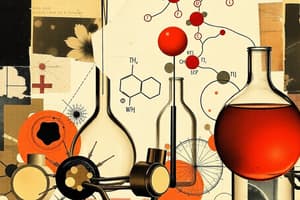Podcast
Questions and Answers
What is the main purpose of the Wurtz reaction?
What is the main purpose of the Wurtz reaction?
- Formation of ethers
- Conversion of alkenes
- Synthesis of alcohols
- Preparation of alkanes (correct)
In the Wurtz reaction, what role does sodium metal play?
In the Wurtz reaction, what role does sodium metal play?
- Solvent
- Catalyst
- Reducing agent (correct)
- Oxidizing agent
Why is dry ether used as a solvent in the Wurtz reaction?
Why is dry ether used as a solvent in the Wurtz reaction?
- To enhance the reaction rate
- To increase the solubility of the reagents
- To stabilize the alkane product
- To prevent side reactions (correct)
What kind of alkyl halides are preferred for the Wurtz reaction?
What kind of alkyl halides are preferred for the Wurtz reaction?
Why is the Wurtz reaction not suitable for preparing alkanes with an odd number of carbon atoms?
Why is the Wurtz reaction not suitable for preparing alkanes with an odd number of carbon atoms?
What is the most common type of catalyst used in the hydrogenation process to convert carboxylic acids into alkanes?
What is the most common type of catalyst used in the hydrogenation process to convert carboxylic acids into alkanes?
Which of the following reactions is involved in the direct hydrogenation of carboxylic acids to generate alkanes?
Which of the following reactions is involved in the direct hydrogenation of carboxylic acids to generate alkanes?
What is the role of the catalyst in the direct hydrogenation of carboxylic acids?
What is the role of the catalyst in the direct hydrogenation of carboxylic acids?
What is the primary purpose of decarboxylation in the hydrogenation process?
What is the primary purpose of decarboxylation in the hydrogenation process?
What is the significance of water splitting in a hydrogenative reaction during the conversion of carboxylic acids into alkanes?
What is the significance of water splitting in a hydrogenative reaction during the conversion of carboxylic acids into alkanes?
Why is it beneficial to start with more complex molecules like carboxylic acids when producing alkanes?
Why is it beneficial to start with more complex molecules like carboxylic acids when producing alkanes?
What is the role of mineral acids, such as sulfuric acid, in the initial steps of converting carboxylic acids to alkanes?
What is the role of mineral acids, such as sulfuric acid, in the initial steps of converting carboxylic acids to alkanes?
What effect does an increase in hydrogen pressure have on the production of alkanes from olefins?
What effect does an increase in hydrogen pressure have on the production of alkanes from olefins?
Why is catalytic hydrogenation preferred over noncatalytic methods for converting carboxylic acids to alkanes?
Why is catalytic hydrogenation preferred over noncatalytic methods for converting carboxylic acids to alkanes?
What potential issue arises when using noncatalytic methods involving solid powders for hydrogenation of carboxylic acids?
What potential issue arises when using noncatalytic methods involving solid powders for hydrogenation of carboxylic acids?
What contributes to the environmentally friendly aspect of catalytic hydrogenation compared to alternative synthetic routes?
What contributes to the environmentally friendly aspect of catalytic hydrogenation compared to alternative synthetic routes?
In terms of performance, why is catalytic hydrogenation often preferable when synthesizing alkanes from carboxylic acids?
In terms of performance, why is catalytic hydrogenation often preferable when synthesizing alkanes from carboxylic acids?
Flashcards are hidden until you start studying




